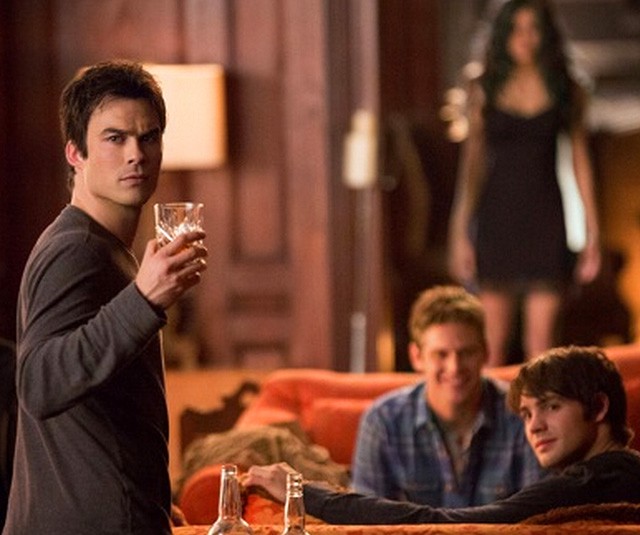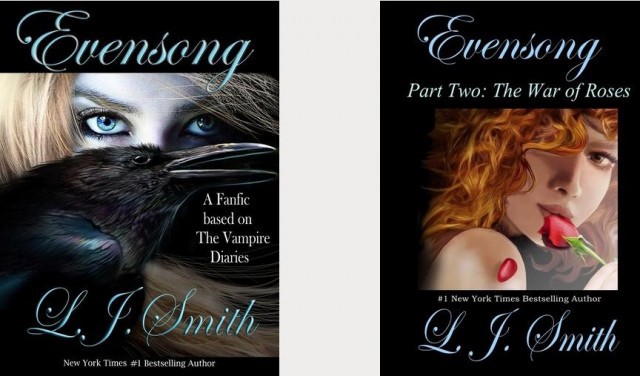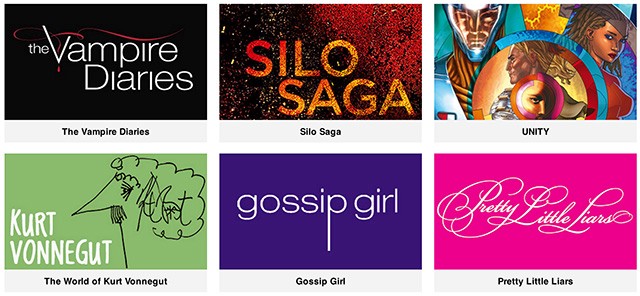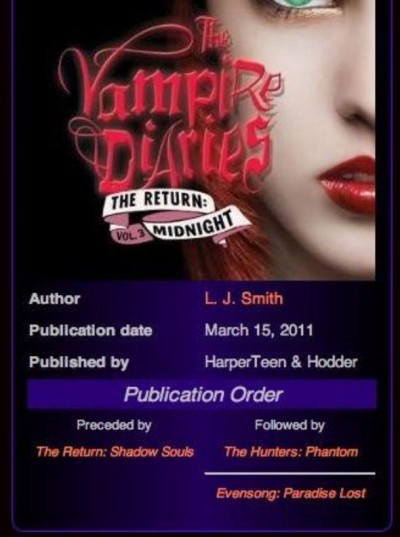The Writer Who Beat The System: How One Woman Resurrected Her Sexy Vampire Brothers
by Mike Pearl

J.K. Rowling recently told Wonderland magazine that Hermione and Harry would have made a better couple than Ron and Hermione. It shouldn’t have mattered. Apart from the fact that we’re talking about the romantic lives of make-believe wizards, not only would Roland Barthes yawn at the author’s opinion about her own work, but the fans had already paired off Harry and Hermione themselves — nine years ago.
But the opinions of authors can’t help but feel more canonical than the things we internet denizens dream up ourselves — particularly when you take into account the connotations that the term “fan fiction” carries for most people.
L.J. Smith’s newest book, Evensong: Paradise Lost, is a work of fan fiction. It’s based on the characters from The Vampire Diaries, the books that gave rise to the TV phenomenon. As with all fan fiction, it’s set in a world to which Smith has no legal right.
But one unique quirk sets Smith’s work apart from most fanfic. She is the original author of the series, now banished from officially contributing. So she is finishing the series by means of a new enterprise: Amazon’s Kindle Worlds, the world’s first corporate venue for fan fiction.
Smith’s authorship lends her new work an unusual and hard to comprehend status: It’s the first work of unofficial-official canon.
Gray areas like this could elevate the respectability of fanfiction itself, a medium that, depending on whom you ask, desperately wants to be elevated to respectability — or doesn’t want or need your goddamned approval to be considered legitimate.
Lisa Jane Smith, Vampire Queen
Lisa Jane Smith is famous for her young adult novels about witches, psychics, and, most of all, vampires. She’s also noted for her candid fan correspondence (and some outdated-looking author photos that make her look like a fabulous 1970s country singer).
L.J. Smith fans claim her as the progenitor of the smoldering young adult vampire phenomenon. Anne Rice’s gothic novels aimed at adults were resurgent in 1990, when vampires were on the wax again after a brief wane. Around that time, HarperCollins turned to a book packager called Alloy Entertainment to hire someone who could churn out an upscale vampire series aimed at teenage girls. Smith, then a young and hungry novelist, took the job, but she didn’t invent the series out of thin air. Most likely “The Vampire Diaries” was a title and a marketing campaign before Smith came on the scene — she just fleshed out the middle part. You know, the setting, characters, story, rules for the entire world? That sort of thing.
If you aren’t already hip to “The Vampire Diaries” phenomenon, it’ll sound vaguely like Twilight but a little less dour. A small town girl, Elena, finds two vampire brothers named Stefan and Damon. They vie for her affection, and a town full of teens is pulled into an exciting supernatural world of romance and intrigue.
The part about being more fun than Twilight may be an accident. Smith takes this material just as seriously as Stephenie Meyer, and the books really don’t share the TV show’s seemingly deliberate campiness. Also critical to your understanding of Vampire Diaries fans: The actors who play the TV versions of the vampire brothers are the objects of that very particular and intense brand of Internet worship.
But back when The Vampire Diaries were just four dishy books rattling around the backpacks of teens — the first three books were published in 1991, the fourth in 1992 — a parallel tale of intrigue was unfolding in Smith’s professional life. By her own accounts, Alloy hid Smith’s name in a tiny corner of the original cover. Because it was so successful, the packager commissioned a different series from her, but literally laughed in her face, Oliver Twist-style, when she asked for more money. After the fourth book, which fans begged for, was published, Smith took a long hiatus from the series. Fan fiction carried the torch for her while she was away.
Varieties Of Fanfictional Experience
Evensong isn’t an official Vampire Diaries trilogy, but picks up where Midnight left off. The fanfic series will eventually go to endgame.
— L. J. Smith (@drujienna) January 25, 2014
As an urbandictionary user put it, “50% of fanfiction is crap, 24% is non-crappy smut, 25% fits into the category of crap and smut, and the remaining 1% is some pretty good stuff.” If you think fanfiction is a bunch of stories about Harry Potter hooking up with Professor Snape, you are not wrong. There’s so much of that online that there’s a name for it: Snarry. Twilight fans on Team Jacob have had their way countless times thanks to fanfiction. A subset of the Bronies writes “clopfic,” situations involving My Little Pony characters that will make your hooves curl.
That’s just the smutty stuff though. Want to find out what drives Chiwetel Ejiofor’s character in Children of Men, or find out whether Maude Lebowski really did have The Dude’s baby? Only the fans can help you.
By my count, no fewer than one hundred Vampire Diaries stories were uploaded to fanfiction.net during the series’ publishing hiatus from 1992 until 2009, when the TV show and the new books appeared. No doubt others were uploaded elsewhere, or never shown to the world. They seem to average roughly 15,000 words. Many feature “Mary Sue” characters, a fanfic term for a surrogate, created for the author to insert him or herself into romantic situations with the characters. Some are pretty crudely sketched: “The sounds of rampant sex weren’t doing anything to aid his sleep, and frankly he didn’t need it rubbing in his face that he just wasn’t getting any…” and others are evocative: “Watching the bowl slowly fill, she noted the subtle twitching of her hands and cursed quietly, clutching the rim of the sink until her knuckles turned white.”
Few had Tolstoyan aspirations, but there they were. If you craved stories about sexy vampire brothers with the same names as the ones in the book series you liked, you had options. But often the stories bore messages at the top such as “Disclaimers: VD, Stefan and Damon belong to LJS.” Fans were showing deference, but were not, legally speaking, providing proper attribution.
Then There Was Edward

By 2009, Twilight had happened. Since Alloy is very good at what it does — around this time, Rebecca Mead of The New Yorker called them “the teen entertainment factory” — and since they controlled the property completely apart from Smith’s desires for the characters, in addition to re-imagining the whole TVD universe as a TV show, the books were dusted off and reprinted with fancier covers. Soon they were flying off shelves.
And after a short time, out popped the first entry in a new trilogy, the L.J. Smith-authored The Return: Nightfall, perhaps the oddest 608 pages ever marketed to young girls, even giving the nutso Twilight: Breaking Dawn and its werewolf-in-love-with-a-baby-that-chewed-its-way-out-of-its-mother storyline a run for its money.
Smith called it the worst book she’s ever written, saying she may have been “rusty” when she wrote it. Fans generally agree. Perhaps more displeased than anyone were the executives at publisher HarperTeen, who were hoping for something that matched the TV series.
But even if Nightfall had stayed on the rails, the books and TV show could never actually gel canonically, and that was no fault of Smith’s. Elena as played by Nina Dobrev was too tough and assertive to be the delicate flower from the novels. The character Bonnie was more of a witch than the psychic she was in the books. A possible Stefan and Elena coupling always seems possible on TV, but in Smith’s last official book, Midnight, she wanted to bring them further apart. Midnight was number one on The New York Times bestseller list — but L.J. Smith herself had become disposable.
After what Smith calls “The Call That Changed My Life,” an Australian fan receiving a response to a complimentary email may have been one of the first members of the public to hear the bad news: “…I have been fired from writing the Vampire Diaries,” she wrote. “Midnight is the last book you will ever see by L. J. Smith in this series. I even wrote the next book, Phantom, for the book packagers and my publishers, HarperCollins, but instead of sending me edits, they sent me a letter addressed to the anonymous ghostwriter who will be taking over the Vampire Diaries series.”
Phantom — the first in the next Vampire Diaries trilogy — was ghostwritten, perhaps completely, and released in 2011. On the fan wiki, where devotees catalogue the minutiae of the TV show, and, to a lesser extent, the books, the article carries a warning: “Before buying this book be aware that it was NOT written by L. J. Smith but by an anonymous GHOSTWRITER.” She has a name: Aubrey Clark. Clark has soldiered on; Unseen, the middle of yet another trilogy, was a bestseller hitting shelves last May. That was just six days after Amazon’s announcement of Kindle Worlds.
And then, on January 15th of this year, L.J. Smith issued what in her profession amounts to a surprise press release: an update on Goodreads. It was the first official notice anyone had received that a new L.J. Smith Vampire Diaries book was on the way, and it left readers with just one week of frenzied anticipation. It also provided some context about Amazon Worlds: “The Vampire Diaries is one of the series that Amazon has obtained the license to include in their Worlds. This means that I can continue to write my version of The Vampire Diaries.” And it also provided some much needed story chronology: “The Evensong arc will pick up more or less where Midnight left off and takes place in an alternate world from the official books that follow Midnight.” The fan fiction writer would now overwrite the canon.
Worlds Inside Worlds

Kindle Worlds announced itself as a platform where fans of world-building fiction can market and sell their stories over Amazon’s Kindle marketplace. Amazon has permission to let users submit stories that fit into select fictional “Worlds” — authorized by the owners of the intellectual property — for profit. (Specifically, a cool 35% share of sales.)
Mainstream blogs mentioned it in passing with a let’s-see-what-happens-here tone. In the fanfic community, reaction to the news was mixed. YA author and advocate Malinda Lo wrote a blog with the headline “Amazon tries to monetize fan fiction; I freak out,” in which she didn’t so much shred Kindle Worlds for mistreating fanfiction as identify it as something separate from fanfiction. “This isn’t Amazon figuring out how to make money off fan fiction; this is Amazon entering into a partnership with media properties to crowdsource officially licensed novelizations.” She compared it to the work of Timothy Zahn, who wrote novels within the Star Wars universe in the early nineties. The Star Wars Expanded Universe is a carefully catalogued canon in its own right.
The Worlds of Kindle run the gamut from current properties with active fan communities to genre books and comics probably hoping to raise their profiles through inclusion in the new service. A significant chunk of them belong to Alloy Entertainment, including The Vampire Diaries, Gossip Girl, and Pretty Little Liars. More have just been announced, including the worlds of Alloy’s Veronica Mars and Ravenswood, more Valiant Comics, something called the Abnorm Chronicles, and The Lizzy Gardner Files. Their big get, G.I. Joe, comes with easily the strangest guidelines for authors.
Kindle Worlds is pretty straightforward about what’s normally allowed. Don’t get Amazon in legal trouble by having Veronica Mars flagrantly endorse Toyota or something. Keep it typo-free. Don’t suddenly bring in Spider-Man or some other world as a crossover — even if they can use that world, keep them separate. Don’t write erotica. Oh, and if you’re writing in G.I. Joe World, Snake Eyes is not allowed to be a fan of The New York Yankees.
Malinda Lo points out that “Fan fiction is based on (let’s face it) doing what the original author(s) would probably not do: slash pairings, crossover stories (who doesn’t love a crossover?!), hot steamy sex, etc.” I asked Philip Patrick, Publisher of Kindle Worlds and Director of Business Development, about this. “Kindle Worlds won’t be for everybody, and that’s OK,” he said. But he pointed out that sex and crossovers would be nice, if they can find a world licensor who will go for it. “We’ve published erotic content in the Worlds that allow for it,” he wrote in an email.
Kindle Worlds wasn’t advertised as a place for people already established in the industry, but, much like how Zach Braff and Zosia Mamet arrived eventually on Kickstarter, it’s following that path. Before L.J. Smith, “Hugh Howey (better known as the bestselling science fiction author of the mega-hit Wool) just published a story called Peace in Amber in The World of Kurt Vonnegut,” Patrick pointed out. It’s a 9/11 story told within the Slaughterhouse Five World. Admit you’re a little curious. (It has a straight streak of five-star reviews.)
Fans also love Smith’s fanfic. It’s currently ranked number one in Kindle Worlds, which has published more than 340 stories in six months, though it’s only in the 10,000s in the Kindle store overall. Performing some very rough calculations using the Kindle Rank Calculator, that means, in the past few weeks that the book and its partial sequel have been on The Kindle Store, Smith has likely earned a few hundred bucks to date in royalties — presuming she’s operating at the 35% level. It could be that Kindle Worlds isn’t going to be a major source of income for authors. Patrick wouldn’t discuss revenue, but told me, “This is a very new business model and we don’t have everything figured out yet, but we’re always open to hearing how we can improve the process.”
For now, Smith can bask in her ecstatic Amazon reviews. “Thank God for Kindle Worlds! I am so glad that L J Smith has finally gotten the opportunity to finish telling her version of The Vampire Diaries story! I have refused to read anything that the ghost writer has written because to me it betrays the real author and the real story,” goes one. “I am beyond thrilled that my life can now be complete with the fanfic continuation of a truly great story!” goes another.
The Headcanon

Unlike other Vampire Diaries fanfic, the Evensong arc has its own section on the fan wiki. To make matters more confusing, the page for Midnight has a split in the chronology — it’s now a choose your own adventure, where readers can now branch off into the official canon in one direction, or can journey on into the new L.J. Smith canon.
It’s exciting and unsettling to see fictional worlds fragmented in this way. Staying emotionally invested in worlds can be exhausting when they are subject to constant reboots, or when contradictory timelines get justified by elaborate ret-cons, or when narrative is straight-up segregated into what ifs. But plain old contradictions have an air of myth. Did Agamemnon sacrifice Iphigenia, his eldest daughter, to the goddess Artemis, or did Artemis save her? Accounts differ. Does Elena wind up with Stefan, or Damon? Accounts differ.
When I began learning about the world of L.J. Smith, I found her heroic. Alloy had sold her down the river to please their most superficial fans. To my mind, even their licensing The Vampire Diaries World to Kindle was a cynical cash-grab — and so it was delightful that, through that act, L.J. Smith had found a back door, a wonderful legal route to revenge. Over time, I came to see Alloy’s point of view as well. To their minds, The Vampire Diaries never belonged to Smith. Sure, they put her name on the cover. Books always carry an author’s name, not least because the draw of an author can be a useful sales tool. But when you look at it from their perspective, L.J. Smith had always been writing fan fiction.
Mike Pearl writes for VICE, and has been featured on DeathandTaxes and Grist. He is not the fundamentalist pastor of the same name.
